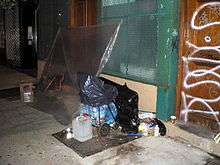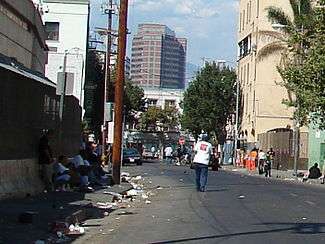Homeless Bill of Rights

The Homeless Bill of Rights (also Homeless Person's Bill of Rights and Acts of Living bill) refers to legislation protecting the civil and human rights of homeless people. These laws affirm that homeless people have equal rights to medical care, free speech, free movement, voting, opportunities for employment, and privacy. Legislation of this type has become law in Rhode Island, Connecticut and Illinois and is under consideration by several other U.S. states.
Controversy over Legislation Affecting the Homeless


At issue in homeless bills of rights are local codes that outlaw loitering, vagrancy, sitting or lying on the sidewalk, begging, eating in public, and other behaviors. These codes disproportionately affect homeless people.[1]
The National Law Center on Homelessness and Poverty concludes its report on the "criminalization of homelessness" with an exhortation to change the laws:[1]
Laws that criminalize visible homelessness are immoral and offend our basic human instincts. They are contrary to the fundamental religious and political principals from which the American people seek guidance, and their existence demonstrates that we have fallen vastly short of our religious and foundational aspirations.
Business interests, represented by the California Chamber of Commerce, have called Assemblymember Tom Ammiano's Homeless Person's Bill of Rights [2] a "job killer" which would create "costly and unreasonable mandates on employers."[3] Some municipalities and local politicians also oppose the laws, which impose state authority to overturn local regulations. San Francisco Supervisor Scott Wiener commented:[4]
Our local laws against forming encampments, passing out and blocking sidewalks, and otherwise monopolizing public spaces would be wiped off the books. Think we have a street behavior problem now? Just wait until this passes.
The Los Angeles Times suggested in an editorial that the Homeless Bill of Rights does not go far enough unless accompanied by economic resources allocated to provide housing.[5] Joel John Roberts, CEO of People Assisting the Homeless, argued similarly that the Homeless Bill of Rights may be toothless and even enabling. Roberts writes:[6]
There needs to be a balance between criminalizing homelessness with ordinances that persecute people who are forced to live on the street, and giving those same people the right to do whatever they want without any consequences.... A more powerful Bill of Rights for people who are homeless, however, would consist of one simple right: the right to housing.
Legislation in the United States
The idea of a "Homeless Bill of Rights" has been discussed periodically in the U.S., and was presented formally by a group of New York City ministers on Martin Luther King, Jr. Day, 1992.[7] City Councilperson Peter Vallone introduced several versions of such a Bill in 1998, despite strong opposition from Mayor Rudy Giuliani.[8]
Puerto Rico and some states have passed laws adding homeless people to their lists of groups protected against hate crimes.[9]
Rhode Island
Rhode Island was the first state in the U.S. to pass a "Homeless Bill of Rights". John Joyce, who was homeless for a period in his life, is responsible for the initial introduction of the bill. The Rhode Island law, S-2052, was ratified in the state of Rhode Island on June 21, 2012 and signed into law by Governor Lincoln Chafee on June 27.[10] It amends the Rhode Island Fair Housing Act with wording intended to protect the rights of homeless people and prevent discrimination against them. It is the first U.S. state-level law designed to protect the rights of homeless people.
| Excerpt from Rhode Island bill S-2052 |
|---|
|
The well-established Rhode Island Coalition for the Homeless (and a newer subgroup called Rhode Island Homeless Advocacy Project) collaborated with the more radical Occupy Providence group to lobby successfully for the Bill.[11][12]
The law does not guarantee positive rights such as housing or food, and some homeless advocates are concerned that it has not had enough impact.[13]
Connecticut
On June 5, the Connecticut Assembly passed a Homeless Bill of Rights (SB 896) with seven protections similar to those passed in Rhode Island. Pending signature by Governor Dan Malloy, the bill would take effect on October 1, 2013. The Connecticut law significantly includes freedom from police harassment in its first section.[14]
| Excerpt from Connecticut bill SB 896 |
|---|
|
(a) There is created a Homeless Person's Bill of Rights to guarantee that the rights, privacy and property of homeless persons are adequately safeguarded and protected under the laws of this state. The rights afforded homeless persons to ensure that their person, privacy and property are safeguarded and protected, as set forth in subsection (b) of this section, are available only insofar as they are implemented in accordance with other parts of the general statutes, state rules and regulations, federal law, the state Constitution and the United States Constitution. For purposes of this section, "homeless person" means any person who does not have a fixed or regular residence and who may live on the street or outdoors, or in a homeless shelter or another temporary residence. (b) Each homeless person in this state has the right to:
(c) Each municipality shall conspicuously post in the usual location for municipal notices a notice entitled "HOMELESS PERSON'S BILL OF RIGHTS" that contains the text set forth in subsection (b) of this section. |
Illinois
On August 22, 2013 Illinois became the second state to adopt a homeless bill of rights.[15]
| Excerpt from Illinois bill SB 1210 |
|---|
| Section 10. Bill of Rights.
(a) No person's rights, privileges, or access to public services may be denied or abridged solely because he or she is homeless. Such a person shall be granted the same rights and privileges as any other citizen of this State. A person experiencing homelessness has the following rights:
(b) As used in this Act, "housing status" has the same meaning as that contained in Section 1-103 of the Illinois Human Rights Act. |
California
State Assemblymember Tom Ammiano (D-San Francisco) introduced a Homeless Person's Bill of Rights[2] to the California Assembly in December 2012.[16] In May 2013, the Appropriations Committee postponed debate until January 2014.[4] Assemblymember Ammiano said in a statement that his bill was suspended largely because of the costs of setting up new infrastructure and enforcing the new rules.[4] A report by the Chair of the Assembly Appropriations Committee estimates that setting up hygiene centers across the state would cost $216 million, with ongoing operating costs of $81 million annually.[2] The report also estimates that setting up facilities for annual law enforcement reports would cost $8.2 million, with ongoing operating costs of $4.1 million annually.[2] Without providing estimates, the report notes that other costs, some potentially significant, include those associated with the right to counsel conferred to the homeless for defending against infractions, and those associated with defending against lawsuits brought against cities by the homeless alleging violations of rights conveyed under the bill.[2]
California's Homeless Bill of Rights(Right2Rest Act), SB 608, was introduced by Senator Carol Liu (D) in February 2015. The ”Right to Rest Act,” would, among other things, protect the rights of homeless people to move freely, rest, eat, perform religious observations in public space as well as protect their right to occupy a legally parked motor vehicle. Also refer to UC Berkeley's Policy Advocacy Clinic Presents: California’s New Vagrancy Laws a New Report on the Growing Criminalzation of Homeless People in California.
A vote was not rendered during the 2015 process in the Housing and Transportation Committee and was asked to come back for a vote in the next California legislation session with amendments in order to get the necessary votes and pass to the next house.
See also
References
- 1 2 The National Law Center on Homelessness and Poverty, "Criminalizing Crisis: The Criminalization of Homelessness in U.S. Cities", November 2011.
- 1 2 3 4 5 Assem. Bill No. 5 (2013-2014 Reg. Sess.)
- ↑ ”Updated homeless 'bill of rights' passes CA legislative committee”; Sacramento Bee, 23 April 2013.
- 1 2 3 T.J. Johnston, "State Homeless 'Bill of Rights' Put on Hold Until Next Year"; San Francisco Public Press, 30 May 2013.
- ↑ Editorial: "Homeless rights bill is wrong: There's no point in criminalizing homelessness. But a proposed 'bill of rights' is not the answer either. What the homeless really need are resources", Los Angeles Times, 11 January 2013.
- ↑ Joel John Roberts, "Is a Homelessness Bill of Rights Just a Bill of Goods?", Huffington Post, 22 June 2012.
- ↑ Hatchett, David. "Homeless 'Bill of Rights' to revive Dr. King's 'fading voice'", New York Amsterdam News, 11 January 1992; accessed via ProQuest, 11 July 2013.
- ↑ Glenn Thrus, "Vallone Plans to Beat Rudy on Homeless Rights Bill", City Limits, 31 August 1998.
- ↑ "Hate Crimes Against the Homeless: An Organizing Manual for Concerned Citizens", National Coalition for the Homeless, January 2012.
- ↑ "Hundreds celebrate signing of Homeless Bill of Rights". WPRO. 2012-06-27.
- ↑ Robert Wengronowitz, "Lessons From Occupy Providence", The Sociological Quarterly 54(2), March 2013. Accessed via Wiley; 3 July 2013. "OP would not have been able to negotiate the deal with the City without the decades-long effort by RICH and later RIHAP to create organizational infrastructure—for example, communication networks, development of coalitional relationships, and media contacts. In fact, RICH's infrastructure itself significantly supported the founding of RIHAP. Rhode Island became the first state to pass a Homeless Bill of Rights in late June 2012, an action less likely without RICH, RIHAP, OP, and their ability to work across differences. For instance, some RICH members were concerned that OP was "too radical," but OP was fortunate in that RICH considers seriously the concept of coalition building. Ryczek (2011, capitalization in original) defended the collaboration this way to RICH members: 'Coalitions rarely see eye to eye on each and every single factor concerning their common interests... We certainly...will not agree on all issues. Yet, where common ground and common goals DO exist it must be our role to move on such commonalities.'"
- ↑ Mallory Moretti, "Occupy Prov. marches for homelessness: Governor allows tents on State House law"; WPRI, 10 December 2011.
- ↑ Jake Grovum, "Nation's 1st Homeless Bill of Rights Slow to Cause Change in Rhode Island", 12 November 2012.
- ↑ Scott Keyes, "Connecticut Passes Landmark ‘Homeless Person’s Bill Of Rights’ Law", ThinkProgress, 12 June 2013.
- ↑ http://www.chicagohomeless.org/illinois-becomes-2nd-state-to-enact-a-homeless-bill-of-rights/
- ↑ Kevin Fagan, "Tom Ammiano backs homeless rights bill"; San Francisco Chronicle, 4 December 2012.
External links
- Text of the Rhode Island bill
- Text of the Illinois bill
- Interview with late Rhode Island homeless advocate John Joyce